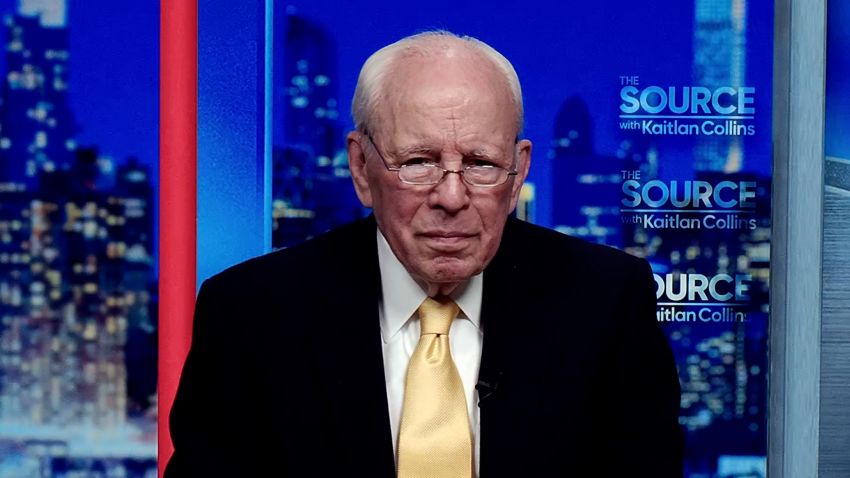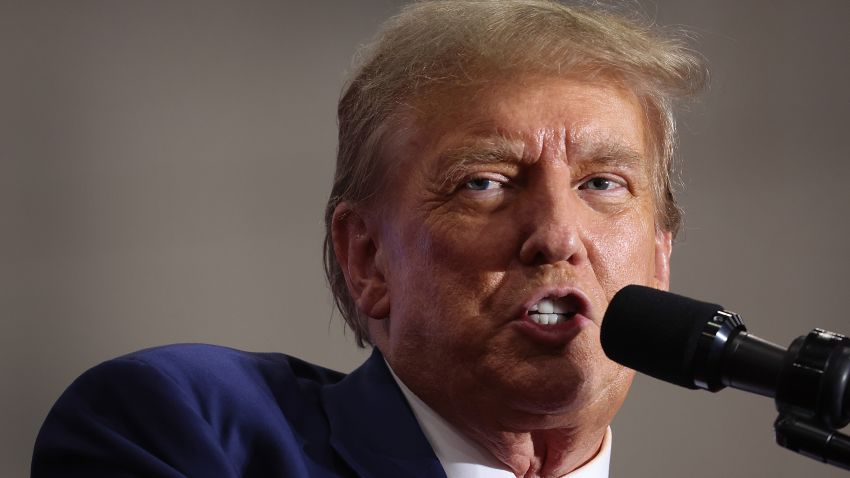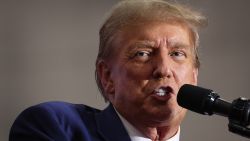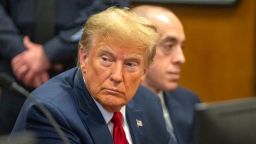Donald Trump is close to running out of time in his last-ditch bid to stave off the historic stigma of being the first former president to go on criminal trial next week.
The presumptive Republican nominee suffered yet another courtroom defeat on Monday in an attempt to delay his hush money trial and move it out of Manhattan. And on Tuesday, an appeals court thwarted yet another attempt to postpone the opening of the trial so that Trump can challenge a partial gag order imposed by the presiding judge.
Trump’s latest legal defeats move him – and the nation – to the threshold of a divisive spectacle that will further strain the justice and political systems and that could have an unpredictable impact on November’s election.
This case, which stems from payments to an adult film actress ahead of the 2016 election, is just one of four criminal cases against the former president. He has pleaded not guilty in all cases against him.
As his legal options narrow, Trump’s attacks on the judge in the New York case and those involved in his other looming trials and his wild claims that he’s the victim of political persecution are getting ever more extreme. In a dark Truth Social post over the weekend, Trump wondered how many “corrupt” judges he’d have to “endure before somebody steps in?” And in a fundraising email, the ex-president slammed his “sham trial” and warned “all hell will break loose” unless he got a new injection of financial support. Judge Juan Merchan, who will preside over the case, last week expanded a gag order on Trump after he named the judge’s daughter and attacked her on social media. Now the ex-president is complaining on his Truth Social network that Merchan is “taking away my First Amendment Rights.” An appeals court will still consider Trump’s request to lift the gag order, but Tuesday’s ruling means the trial will go ahead while the process plays out.
Trump’s escalating efforts to delegitimize the New York trial before it starts came as CNN obtained the jury questionnaire in the case, which reflects the unusual political context of this trial. Potential jurors will be quizzed about where they get their news, if they’ve been to a Trump rally and whether they have been a member of an extremist group like the Proud Boys. They will also be asked about their feelings about the former president but not about what political party they belong to or who they’ve voted for.
This is consistent with attempts before all trials to ensure jurors can be fair and impartial in judging a case based on the evidence rather than their political views or prejudices. Prosecutors in the case are not trying to prove that a hush money payment to Stormy Daniels in 2016 was illegal. Rather they will tell the jury that the ex-president falsified business records to cover it up, in an attempt to mislead voters before the 2016 election. But some critics of the case see the idea that it’s about election interference as a stretch. And if there’s one of the four criminal trials that Trump would prefer to take place first, it’s this one.
The delays in multiple cases surrounding Trump are often caused by him exercising his rights as a defendant to exhaust the full extent of his right to appeals. But there is a clear trend of him using frivolous legal challenges to slow the road to trials. With only four weekdays until the New York trial begins, the chances that it will be further delayed are fading fast. Still, Trump is one of the most prolific litigants in modern history and given the political incentives for him to dodge accountability, more long-shot legal challenges can’t be ruled out.
If he can’t delay the opening of the trial on April 15, he will spend four days a week confined to a courtroom – leaving the campaign trail open to his rival, President Joe Biden. But the ex-president sought to mitigate one of his key vulnerabilities in the race on Monday, declaring that abortion – a potentially defining general election question – should be left to the states. Biden was having none of it, saying his predecessor couldn’t be trusted not to sign a federal ban if one ever passed Congress, adding at a Chicago fundraiser, “Trump is in trouble, and he knows it. He’s worried voters will hold him accountable.”
Special counsel tries to thwart another Trump delaying tactic
In Washington, special counsel Jack Smith filed his latest brief to the Supreme Court Monday, designed to derail Trump’s sweeping claim of presidential immunity that has delayed the start of his federal election interference trial. Trump is arguing that the office of the presidency would be neutered if occupants can face criminal prosecution for their actions once they have left office. But Smith pushed back against this argument, which would implicitly mean that presidents have unchecked power.
“The effective functioning of the presidency does not require that a former president be immune from accountability for these alleged violations of federal criminal law,” Smith wrote. “To the contrary, a bedrock principle of our constitutional order is that no person is above the law – including the president.”
Smith also sought to short circuit another Trump gambit – a suggestion to the Supreme Court that the justices could send the case back to the lower courts for more arguments if they find that a president enjoys only partial immunity. Such a move would delay the trial for many months – certainly until after the election. If he’s reelected, Trump would regain presidential powers that would allow him to stall or even end the federal case against him completely. The Supreme Court will hear arguments in the case on April 25, and a decision is expected by July.
Smith’s attempts to bring the ex-president before a jury are also being frustrated in Florida, where Trump-appointed Judge Aileen Cannon has been accused by many legal scholars of slow-rolling the forthcoming trial over the ex-president’s hoarding of classified documents.

Trump is making a fresh effort to gum up his election interference trial in Georgia, part of his consistent efforts to try to prevent the other cases in which he’s been indicted from going forward before November’s election. Trump’s lawyers want the state’s court of appeals to decide that his effort to pressure local officials to overturn his 2020 election loss was merely an exercise of his free speech. “There is no democracy without robust and uninhibited freedom of expression,” Trump attorney Steve Sadow said in a statement.
Fulton County Superior Court Judge Scott McAfee has already refused to dismiss the case on the notion that Trump’s actions were protected free speech. Trump’s critics are likely to view his latest gambit as a typically obtuse counter factual argument that he was not trying to destroy democracy but to save it.
How Trump is trying to politicize jury trials
The key decision in the New York case on Monday centered on a claim by the former Republican president’s attorneys that their client cannot get a fair trial in the city where he made his name, and which is overwhelmingly liberal. Associate Justice Lizbeth González Monday denied the motion to stop the trial while the issue is hashed out and said there would be no further arguments on the question.
Trump’s strategy is not new – he’s previously made similar claims about the fairness of being tried in Washington, DC, another liberal city. Prosecutors, however, typically bring charges in a jurisdiction where an alleged offense took place. And if taken to its logical extremes, the ex-president’s arguments would mean that a political figure could only be tried in a location where a potential jury pool would be filled by people likely to vote for them. Such a scenario would politicize the entire legal system and threaten the principle that everyone is equal under the law – even and especially former and possibly future presidents.
During his barnstorming Republican primary campaign, Trump was effective in turning his four indictments to his advantage, wielding the idea that he was a victim of politicized justice to gather the GOP base around him and squeeze out his rivals.
One of the biggest questions of this campaign will be whether the reality of a president on trial has a similar impact among a general electorate or whether it will spark a backlash against Trump, especially if he is found guilty.
This story has been updated with additional developments.


















